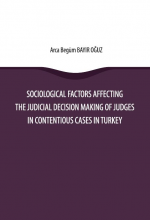 The cases that occurred are the same, the article that applied is the same, but the results are different. This book is trying to answer the following questions: why do judges decide differently in the same cases even applying the same article? and what are the sociological factors that affect the judges' judicial decision-making processes in controversial cases in Turkey? Franz Kafka says in his book the Case "One of the characteristics of such courts is not only convict innocent people but also condemn without knowing the cause" but this qualitative research shows the scientific results about sociological causes concerning whose subjectivity defined as objectivity in Turkey's judicial decision-making processing from an interdisciplinary perspective in the context of sociology and law. This research findings indicate that class, family, education, culture, emotions, experiences, gender, workload, media, and social pressure influence the judicial decision-making processes of judges in Turkey.(ARKA KAPAKTAN)
The cases that occurred are the same, the article that applied is the same, but the results are different. This book is trying to answer the following questions: why do judges decide differently in the same cases even applying the same article? and what are the sociological factors that affect the judges' judicial decision-making processes in controversial cases in Turkey? Franz Kafka says in his book the Case "One of the characteristics of such courts is not only convict innocent people but also condemn without knowing the cause" but this qualitative research shows the scientific results about sociological causes concerning whose subjectivity defined as objectivity in Turkey's judicial decision-making processing from an interdisciplinary perspective in the context of sociology and law. This research findings indicate that class, family, education, culture, emotions, experiences, gender, workload, media, and social pressure influence the judicial decision-making processes of judges in Turkey.(ARKA KAPAKTAN)
TABLE OF CONTENTS
CHAPTER 1
Introduction
CHAPTER 2
The Judge's Judicial Activities In Turkey
2.1. The concept of judicial activity
2.2. The judge's judicial activities
2.2.1. Interpretation of legal rule
2.2.2. Judicial discretion
2.2.3. Creation of legal rule
2.2.4. Other types of gaps expected to fill in the judge's judicial activities
CHAPTER 3
Judicial Decision Making As "Pure Logic" Or "Determinate"
3.1. Preceding theories on judicial decision-making processes
3.1.1. Sir William Blackstone
3.1.2. Legal formalism: judicial decision making as pure logic?
3.1.3. American legal realism: judicial decision making as determinate?
CHAPTER 4
Theoretical and Conceptual Framework
4.1. Theoretical framework
4.1.1. Bourdieu's theory of practice into judicial-decision making
4.2. Conceptual Framework
4.2.1. Jurisdicton, judge and judicial decision making
CHAPTER 5
Research Method
5.1. Research Design
5.1.1. Participants
5.1.2. Data collection and analysis
CHAPTER 6
"The Judge Make Decisions with Human Emotions"
6.1. "When did the white collar become a judge, a prosecutor?"
6.2. "...In fact, even the judge's breakfast affects her/his decisions"
6.3. "The Kadi of Üsküdar and the Kadi of Beşiktaş make different decisions about divorce, two sides of the sea, two different decisions in the same case..."
6.4. "When I started my career, I had a child, I had a girlfriend, I went abroad but now you send people who are twenty-three years old, don't do any of these things and tell them divorce husband and wife"
6.5. "Is sexism violence? yes, definitely"!
6.6. "You become a mechanic, you lose your soul, you forget that you are human, in such a case, does the other person who forgets herself/himself remember other as person? I'm asking you"
6.7. " If the person has already been convicted by public, it is not always easy to decide on the contrary"
CHAPTER 7
Discussion
REFERENCES
